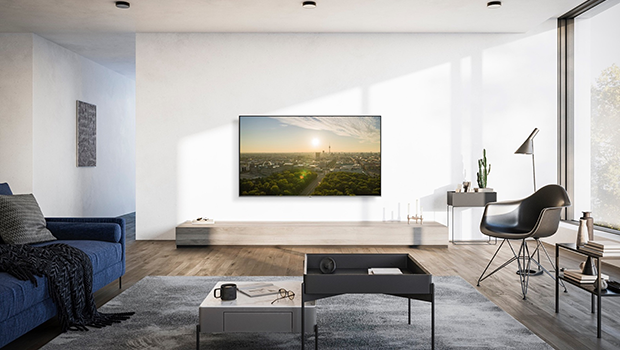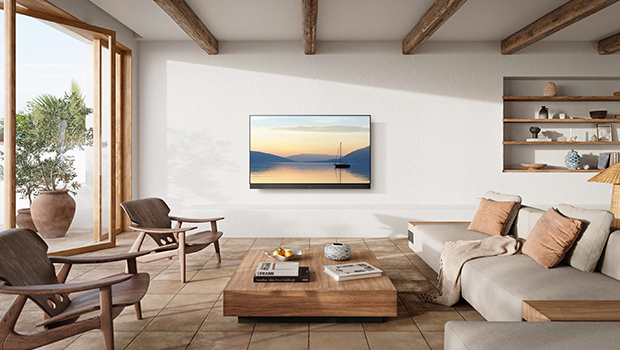
Panasonic at IFA in Berlin showed two extraordinary prototype TVs which demonstrate how it is working on pushing the boundaries of TV.
One prototype, codenamed “MegaCon” for Mega Contrast, uses dual LCD layers to deliver black performance which rivals that of an OLED TV whilst also being capable of high brightness too.
The second prototype is a transparent OLED, the result of a conceptual research project by Panasonic and Vitra, shows how Panasonic is working on better integrating electronic devices into living spaces by having them melt into the background when not in use.
Codename: MegaCon
The “MegaCon” Dual Panel LCD monitor prototype has been developed in-house using a Panasonic manufactured module and fully utilises over half a century of Panasonic television expertise.
It uses a high performance 4K outer panel with a monochrome inner panel to modulate the direct LED backlight, thus delivering pixel-level dimming and a contrast ratio of 1,000,000:1 which is unheard of for LCD panels. In terms of brightness it can hold a full field peak brightness of 1000 nits indefinitely, whilst also covering 99% of the DCI P3 colour standard.
Following exhaustive testing by Hollywood studios and post production houses, it delivers mastering monitor levels of colour accuracy.
Furthermore, unlike other similar dual panel LCD displays, based on feedback from the Hollywood community it also features a very wide viewing angle without any loss of colour fidelity and uses unique Panasonic technology to eliminate any parallax effect between the dual panels.

Transparent OLED
Panasonic also exhibited a transparent OLED concept display, which was first shown at this year’s Salone del Mobile, the world’s largest and most prestigious furniture and lifestyle exhibition.
The transparent OLED display, which resembles a glass cabinet, is crafted from a wooden finish frame holding what appears to be a pane of glass. As such it blends naturally into any contemporary living space. However, the moment the device is switched on, it transforms into a vivid OLED display.
The transparent OLED is the result of a conceptual research project by Panasonic and Vitra. Through a series of workshops Vitra provided expertise in furniture and space design which was combined with Panasonic’s focus on using advanced technologies to improve lives. As a result a number of ideas about how new technologies can be used to seamlessly integrate audiovisual devices into our living space were developed. The transparent OLED display is the first of these ideas to come to fruition.
The transparent OLED display converts from a passive object into a lively and dynamic element, from something meant to be seen into something meant to be watched.
Designed by Scandinavian based designer Daniel Rybakken and Panasonic Design Kyoto, the OLED display consists of materials such as wood, metal and glass. The technological components are cleverly concealed within the wooden finish frame, which doubles as a stand for the device. A lightning element, which enhances the viewing and ambient experience, is also directly and unobtrusively housed within the frame.
Both prototypes are on show at Panasonic’s booth at IFA from today until 11 September.

Recommend Pages
News articles relevant to this topic were not found.
-
Panasonic W95A Mini LED and W90A Full Array LED TVs bring new gaming and cinematic features

-
Cinema quality at home: Panasonic’s Z80A OLED TV brings new smart features for the ultimate viewing experience

-
Panasonic announces the new Z90A and Z85A OLED with Panasonic Premium TV and Fire TV built in

-
Explore More, Feel More: Enjoy enriched experiences with the new Panasonic Premium TV’s Z95A and Z93A

-
Panasonic announces new Premium TV W80A for a unique and immersive ULTRA HD experience

-
Panasonic W60A Powered by TiVo brings a world of extraordinary entertainment

-
Explore More, Feel More: Panasonic announces the Z95A and Z93A with Fire TV built in

-
Panasonic’s MZ980 OLED TV brings Hollywood into the home with blockbuster performance













